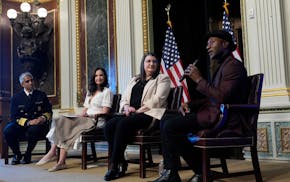Armed with books and an intellectual appetite, about a dozen residents of Summit Place Senior Campus in Eden Prairie arrived in the great room on a recent evening, eager to feed their hungry minds.
For the next hour, they snacked on brownies and sipped pink lemonade and coffee while chewing over their latest book club selection, "A Wrinkle in Time" by Madeleine L'Engle.
Hennepin County associate librarian Julia Sjoberg kept the conversation going, prompting the women with questions such as: What makes a book a classic? And, is this particular children's book worthy of the distinction?
"To me, it is a classic," Ruth Fingerson, 78, volunteered. "Because in 1962 and in 2017, girls need to get the message that they can be agents in their own lives."
The others nodded solemnly in agreement.
As they continued comparing notes about the book's characters, themes and plot, the women also told stories about their own lives.
Fingerson, a retired elementary school teacher, talked of her experience first reading "A Wrinkle in Time" years ago. Others shared anecdotes about their children and grandchildren.
"This does give them a chance to get to know their neighbors," said Susan Woodwick, service manager for outreach for Hennepin County Library.
The county library system is helping to launch book clubs like the one at Summit Place in an effort to foster more social interaction among older adults and to help keep their minds active.
The senior book clubs have emerged as a way to get books and other library materials to people who have trouble getting to the libraries. So far, there are nine retirement communities, senior centers and libraries with clubs.
"This can really be transformative in these settings, where sometimes it can be a tough setting to break into socially," Woodwick said. "Sometimes the most active reader may not be out there socially."
Older adults are especially vulnerable to social isolation, studies have shown.
Prolonged social isolation has been linked to depression, high blood pressure and dementia, among other conditions. Health risks of social isolation are akin to smoking 15 cigarettes a day, according to the AARP Foundation's Connect2Affect program.
Meanwhile, research shows that learning new things and connecting socially may help to keep the mind sharp. In fact, joining a book club is one of the activities recommended by the Global Council for Brain Health to help strengthen the aging brain.
Doing an activity with others makes it more likely that you'll continue to do it, according to the council. That evidence resonated with Woodwick, who said that the seniors who participated in the county libraries' book clubs reported that they are now reading more.
The libraries offer book club kits, including large-print books, and discussion questions, as well as a professional librarian who can lead the discussions.
"We wanted to make them more friendly," Woodwick said, noting that the conversations were not meant to be stuffy. "We're mindful that this is not English Literature 101. That's not the purpose of these discussions."
People living in senior residences can become isolated easily. The clubs give them an opportunity to socialize and to exercise their minds, through reading and through listening to others' perspectives.
A recent survey of participants in the Hennepin County Library senior book clubs revealed that 19 percent reported that they changed their opinion about something after the discussion.
"That's a reminder that people are continuing to think about what's going on in the world," Woodwick said.
It's not only the senior residents who are getting something out of the book clubs.
"The librarians say it's the most rewarding part of their job," Woodwick said.
New connections
Having friends or a community of colleagues is a strong defense against depression and anxiety, particularly as we age, said Alison Romstad, a geriatric nurse practitioner for Fairview Health Services.
Maintaining strong social connections also can lower hypertension (abnormally high blood pressure), which is often the precursor to heart disease, she said.
Making the transition from living in one's own home with known neighbors to senior housing with new people can be difficult.
"Just the whole concept of meeting new friends can be tough," Romstad said. "It's tough for us in kindergarten, and that same struggle continues for us when we're in our 80s and 90s."
While reading is a solitary activity, it's one that challenges the mind — another key to aging well. Taking part in group discussions, in which participants are listening to other people's thoughts and ideas, also sharpens the mind.
"It's that stretching of the brain that keeps it young," Romstad said.
The senior book clubs have featured all kinds of books, including a few, such as "A Wrinkle in Time," that were once widely banned. The most popular book titles have included: "I Am Malala" by Malala Yousafzai, "The Wright Brothers" by David McCullough and "A Man Called Ove" by Fredrik Backman.
And while the libraries offer fiction and nonfiction books to the clubs, they have noticed a clear preference from the group members. "We continually hear from our readers that they want more nonfiction," Woodwick said.
More than 200 people have been served by the senior book clubs since 2015, when a grant from the Friends of Hennepin County Library and Allianz Life made it possible for the library to buy the book club kits.
Looking forward to it
Back at Summit Place, Sjoberg asked the women about time travel — a concept explored in "A Wrinkle in Time."
"If you had the opportunity to time-travel, would you?" she asked.
"If you have to go through the airports, then no," said Bev Folkestad, 83, whose answer elicited laughter from around the room.
Connie Magoffin was up for it. "I definitely would time-travel," she said, "but I don't know which time period I'd visit … maybe the future?"
Members of the Summit Place book club said participating in the every-other-month discussions gives them something enjoyable to do, and something to look forward to.
"The kinds of people who would want to join a book club are my kind of people," said Fingerson, for whom this is the first time belonging to a formal book club, although she's been an avid reader all her life. "I like to be challenged, to have new things to think about and new books to read."
She stays active in other ways, doing swimming pool exercises a couple of times a week and attending the communal dinners. But the book club offers rigorous intellectual stimulation.
"You never know what ideas are going to come popping out of the minds of these people — they are all smart people," she said.
The club provides another benefit for Fingerson, who is a caregiver for her husband, who has Parkinson's disease. "It gets me thinking about other things. It's a stress reliever."
Allie Shah • 612-673-4488 • @allieshah

Photographer alleges he was forced to watch Megan Thee Stallion have sex and was unfairly fired
Phish fans are famously dedicated. What happens when they enter the Sphere?
Minneapolis will bid to host Sundance Film Festival

Icehouse on Eat Street in Mpls. facing eviction for unpaid rent
